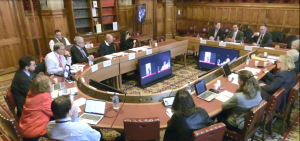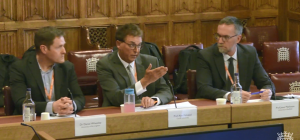 On Monday 10 March, Professor Alan Felstead – Emeritus Professor and former WISERD co-director – gave oral evidence to the Home-Based Working Committee in the House of Lords. His evidence was broadcast live on parliamentlive.tv.
On Monday 10 March, Professor Alan Felstead – Emeritus Professor and former WISERD co-director – gave oral evidence to the Home-Based Working Committee in the House of Lords. His evidence was broadcast live on parliamentlive.tv.
The House of Lords Select Committee on Home-Based Working was appointed on 30 January 2025 and is chaired by Baroness Scott of Needham Market. The call for evidence opened on 5 March 2025 and will close on 25 April, with the Committee’s report published by 30 November 2025.
The inquiry will address the challenges and opportunities of remote and hybrid working for workers and employers, the impact of remote and hybrid working on productivity, and any wider consequences of remote and hybrid working for the UK economy and society. The inquiry will also consider any policies the UK Government should enact.
 Professor Felstead was invited to oral evidence to the first public session of the Committee. In the following week, he was invited to give private evidence to the Committee Secretariat. He will also be submitting written evidence based on his long history of research in this area. This includes his WISERD report on homeworking which attracted widespread commentary in the media, his recent book on remote working and his forthcoming analysis of new data taken from the Skills and Employment Survey 2024.
Professor Felstead was invited to oral evidence to the first public session of the Committee. In the following week, he was invited to give private evidence to the Committee Secretariat. He will also be submitting written evidence based on his long history of research in this area. This includes his WISERD report on homeworking which attracted widespread commentary in the media, his recent book on remote working and his forthcoming analysis of new data taken from the Skills and Employment Survey 2024.
 Professor Felstead started his oral evidence by outlining his own personal and research experience of working at home and pointing out that “homeworking itself has been around for centuries”. He recalled researching the phenomenon in the 1990s, while at the same time reflecting on his own family’s experience of working at home: “My grandad used to cut out leather for the boot and shoe trade in Leicester, and my mother-in-law was a post machinist, stitching leather onto soles”. Both worked at home. Moving forward over 30 years, “homeworking now means something very different”, with a focus on work previously done in offices rather than on factory work.
Professor Felstead started his oral evidence by outlining his own personal and research experience of working at home and pointing out that “homeworking itself has been around for centuries”. He recalled researching the phenomenon in the 1990s, while at the same time reflecting on his own family’s experience of working at home: “My grandad used to cut out leather for the boot and shoe trade in Leicester, and my mother-in-law was a post machinist, stitching leather onto soles”. Both worked at home. Moving forward over 30 years, “homeworking now means something very different”, with a focus on work previously done in offices rather than on factory work.
However, for both types of homeworkers working and living in the same space “brings two worlds that have previously been separated together in the same space – the home”. This is having dramatic consequences for the nature of today’s office with more desk sharing and the emergence of the home office, for example. Professor Felstead told the Committee that “the old office is changing … and the new office is being reborn in people’s homes”. But not everyone has the space or the resources to create a home office – many have to make do with working in the kitchen, on the dining room table or on the sofa.
The increased focus on protecting today’s homeworkers may, however, have an unintended consequence in cementing inequalities. Professor Felstead said that his research shows that: “Those who are able to work at home are relatively well paid and there are many groups of workers for whom that flexibility is not possible. So, I am a little worried that sometimes we are promoting a two-tier labour market structure and helping those who probably need to be helped least”.
